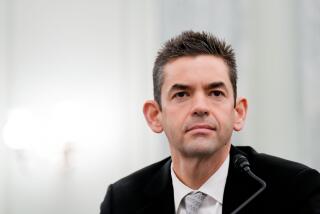Let ‘We the People’ Have Role in Space Flight, Too
- Share via
If you dream of flying in space or being a pioneer on the moon, forget it for the next 40 years. Sally Ride’s plans, as described to Congress before the release of her official NASA report this month, have left you out.
Only members of the astronaut club will pioneer the moon and take that trip to Mars. In fact, with the teacher-in-space program on indefinite hold and the journalist-in-space project already well into oblivion, the shameful truth is that there are now no plans whatever for putting ordinary, non-technical Americans--the patient folks who have paid for the space program all these years--on any space flight. The message of the Constitution, summed up in the three words, “We the People,” is lost in space. Ride’s report may be a symptom of the mental rut that NASA is in. Space planners are victims of their own narrowness; their dreams are the straitjacketed dreams of technocrats.
You don’t have to be clairvoyant to understand why these plans leave the public cold. Americans may even bridle at the outrageous assumption that career astronauts are the only bona fide risk-takers in a whole nation descended from pioneers and immigrants, people who risked far more than an eight-minute rocket ride to attain their dreams. They may hate the idea that the New Frontier will become the “entitlement” of this elite group of technocrats.
I propose a new initiative for NASA: Open up the New Frontier to the American people. Give “We the People” a chance to get into space. NASA can broaden direct citizen participation in the space program immediately, at little expense. It could put a reporter on the “resurrection” flight, the very next one. It could put a teacher on the following one, acknowledging the “entitlement” of our children to have access to space. It could fly an ordinary citizen on almost every flight.
NASA could make psychologists, educators, business entrepreneurs, writers, historians, inventors and artists permanent members of the astronaut corps to revitalize American culture and extend American enterprise. NASA’s usual excuses for not enriching the human contingent in space--that the frontier is not “safe,” shuttle flights are not “regular” or we must wait for a safer vehicle than the shuttle--are stupid and shallow. The Challenger disaster was not the first time Americans died on a frontier, pursuing a great dream. It has not turned us into a nation of chickens, nor has it altered our yearning to go forward in spite of the risks.
There is absolutely no reason why we cannot be included on our own $16-billion space station, our $100-billion settlement of the moon or our $150-billion voyage to Mars. In fact, the journey to Mars shouldn’t be another rock-collecting expedition. It should be Plymouth Plantation on a grand scale. The moon shouldn’t be a propellant-making experiment or a NASA equipment-testing ground, but an extension of the American Dream. Who is to say that a colony made up of a farmer, a merchant, a cook, a radio operator, a construction engineer, a writer, a preacher, a judge, a comedian, an inventor, a nurse and some children might not be more successful at living on the moon than a bunch of career astronauts? Maybe it is easier to teach non-astronauts the technical skills necessary for space survival than astronauts the diverse human skills of making a life in the wilderness.
When the United States moves forward into space again, there is a compelling reason why NASA should include ordinary citizens on every endeavor, large or small, mundane or wonderful: because this nation trusts in the wisdom, courage and integrity of “We the People.” That has been our principle and our history; that has been our dream and our achievement. Everything we were, are and will be is rooted in that trust. Until common citizens participate directly in building the New Frontier, America’s space future will remain as paralyzed as it is now--with paper dreams and stillborn hopes.
More to Read
Sign up for Essential California
The most important California stories and recommendations in your inbox every morning.
You may occasionally receive promotional content from the Los Angeles Times.













